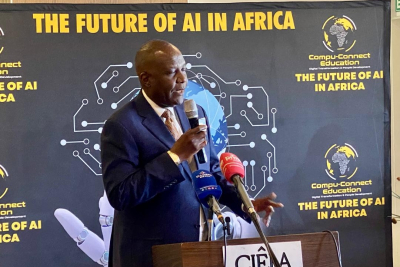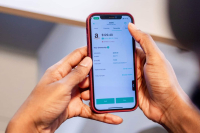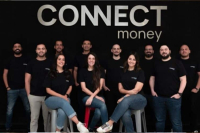
Brief (434)
On Thursday, June 27, Kalil Konate, the Ivorian Minister of Digital Transition and Digitalization, and Téte António, the Angolan Minister of Foreign Affairs, signed a cooperation agreement during Angolan President João Lourenço's visit to Côte d'Ivoire. The agreement aims to pool efforts to enhance the use of technological tools and improve public service delivery in both countries.
On Wednesday, May 29, the UK-based venture capital firm Leo Lion opened applications for its Future of Capitalism 2024-2025 contest. This global competition offers up to $1 million in investment to startups developing technologies aimed at improving business operations. Applications close on September 30, 2024. Eight finalists will be invited to London for Pitch Day, which will take place in February 2025.
On Tuesday, June 25, Beninese Minister of Digital and Digitalization, Aurélie Adam Soulé Zoumarou, inaugurated the Technical Committee for Startup Labeling. Composed of seven members appointed for a renewable two-year term, the committee will be responsible for receiving and reviewing applications from micro, small, and medium enterprises. It will periodically publish the list of labeled startups, notify applicants of the decisions resulting from the application review, and issue decisions on the revocation of granted labels.
In June 2024, Ecobank opened applications for the seventh edition of its Fintech Challenge. This competition invites both mature and startup fintech companies to collaborate with the bank for a chance to win a grand prize of $50,000. Finalists will have the opportunity to integrate their solutions into Ecobank’s network, which spans 35 African countries. Applications close on July 7, 2024.
On Thursday, June 20, Benin officially adhered to the Council of Europe Convention on Cybercrime, signed in Budapest, Hungary, in 2001. The goal is to strengthen its legal framework to enhance its cyberspace and combat cybercrime more effectively.
The Zambian government has begun developing an artificial intelligence (AI) framework, Minister of Science and Technology, Felix Mutati announced on June 27. To this end, the government is collaborating with the Tony Blair Institute to develop an AI strategy.
With this announcement, Zambia joins a select group of African nations that are embracing AI technology.
Bamboo, the Nigerian investment app that allows users to invest in US stocks, has expanded its operations to South Africa.
Bamboo’s entry into South Africa aims to capitalize on the country’s growing interest in international investments and digital financial services. The company’s expansion is expected to boost the African fintech sector and contribute to economic development.
On Sunday, June 23, the Algerian Chamber of Commerce and Industry (CACI) launched a digital platform for investors. Accessible via https://invest.gov.dz, the platform aims to facilitate communication and establish connections between Algerian and foreign businesspeople. It also seeks to simplify foreign investors' access to the Algerian market, particularly by streamlining the visa application and acquisition process, bypassing traditional steps.
Egyptian fintech startup Connect Money announced on Tuesday, June 25th, that it successfully raised $8 million in a funding round. The funds will be used to develop an integrated financing platform.
On Monday, June 24, Chadian Minister of Communications, Digital Economy, and Administrative Digitalization, Boukar Michel, met with Wang Xining, the Chinese Ambassador to Chad. The discussions covered various topics, focusing primarily on strengthening Sino-Chadian cooperation.
During the talks, Boukar Michel assured the ambassador of his Ministry’s commitment to working synergistically to meet the expectations of the Chadian population in the areas of digital economy and communications.
More...
On Friday, June 21, Rose Pola Pricemou, Guinea's Minister of Posts, Telecommunications, and the Digital Economy, met with His Excellency Huang Wei, the Ambassador of the People's Republic of China to Guinea. The meeting provided an opportunity for both parties to discuss potential collaborations and partnerships in the digital sector aimed at advancing Guinea's development.
During her visit to Madagascar, Jennifer Bachus, Principal Deputy Assistant Secretary of the U.S. Bureau of Cyberspace and Digital Policy, met with a Malagasy delegation led by Tahina Razafindramalo, Minister of Digital Development, Posts, and Telecommunications, on Thursday, June 20. The primary objective of this meeting was to promote a safe and secure cyberspace, enhance Madagascar's digital resilience, and support local initiatives for digital transformation.
Burundian Minister of Communication, Information Technologies, and Media, Léocadie Ndacayisaba, formally launched the operations of the Société de Télédiffusion Numérique du Burundi (STNB) in collaboration with China on Saturday, June 15. The institution will oversee the future national digital terrestrial television platform.
The transition to digital television, according to the Minister of Communication, aims to promote development across all sectors in the country.
Guinean Minister of Posts, Telecommunications, and Digital Economy, Rose Pola Pricemou, met with the Spanish Ambassador to Guinea, Angel Antonio Carrascal Gutierrez, on Wednesday, June 19. The meeting aimed to explore new opportunities for collaboration between the two countries in the areas of postal services, telecommunications, and the digital economy















